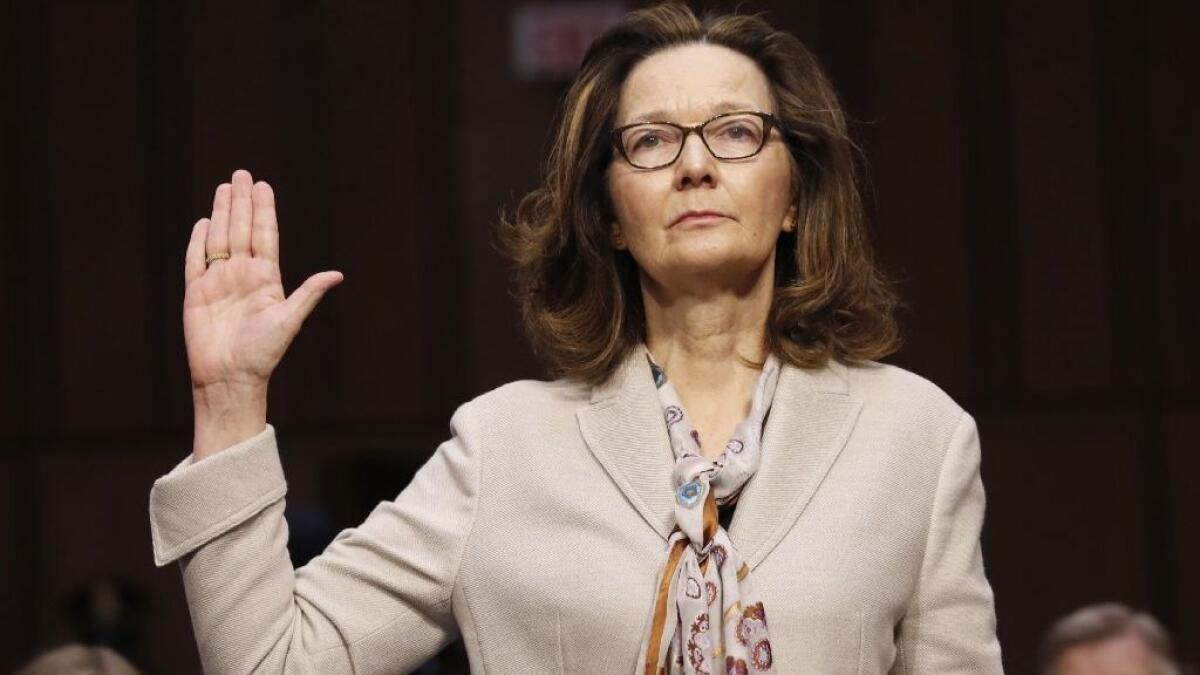Opinion: Like Obama, CIA nominee Haspel wants to ‘look forward’ on torture questions

President Trump probably wouldn’t appreciate the comparison, but his nominee to head the CIA seemed to be channeling Barack Obama in some of her testimony at her Senate confirmation hearings.
As expected, Acting CIA Director Gina Haspel, a career intelligence officer and a veteran of the agency’s clandestine service, was questioned about her role in the “enhanced interrogation” of suspected terrorists after 9/11.
Haspel reportedly supervised a “black site” in Thailand during the interrogation of Abd al Rahim al Nashiri, a Saudi suspected of involvement in the 2000 bombing of the U.S. destroyer Cole. According to the Senate Intelligence Committee, Nashiri was waterboarded at least three times.
Haspel promised the same committee Wednesday that “under my leadership CIA will not restart … a detention and interrogation program” such as the one the CIA pursued during the George W. Bush administration. She noted that “the law provides that no individual in U.S. custody may be subjected to any interrogation technique or approach that is not authorized by and listed in the Army Field Manual” — a stricture that rules out waterboarding and other “enhanced” interrogation methods.
Haspel also said that “I would not allow CIA to undertake activity that I thought was immoral — even if it was technically legal.” But, in a riveting back-and-forth, she resisted an attempt by California’s Sen. Kamala Harris to get her to condemn what the agency did in the past.
Harris: “It’s a yes or no answer. Do you believe the previous interrogation techniques were immoral? I’m not asking, ‘Do you believe they were legal?’ I’m asking ‘Do you believe they were immoral?”
Haspel: “Senator, I believe that CIA did extraordinary work to prevent another attack on this country given the legal tools that we were authorized to use.”
Harris: “Please answer yes or no. Do you believe in hindsight that those techniques were immoral?”
Haspel: “Senator, what I believe sitting here today is that I support the higher moral standard we have decided to hold ourselves to.”
Listening to this exchange, it was hard not to be reminded of a much-criticized statement by Obama. Asked about a possible investigation of the excesses of the Bush administration’s war on terror, Obama said that while clear acts of wrongdoing should be punished, “I’m more interested in looking forward than I am in looking backwards.”
As part of that forward-looking policy, Obama banned waterboarding by executive order, ordered the closing of secret CIA prisons abroad and promised to shut down the prison at Guantanamo Bay. (Congress had other ideas.) But Obama avoided actions that would have held his predecessor accountable for migrating to what former Vice President Dick Cheney once called the “dark side.”
The “look forward, not backward” policy was an exercise in pragmatic politics on Obama’s part, but it also amounted to a sort of amnesty for extreme, even immoral measures taken in the post-9/11 panic.
The problem for Haspel is that senators inclined to extend such a dispensation to her for her role in those frightening times must contend with the fact that she would be serving a president who looks back at those days and apparently likes what he sees. “I would bring back waterboarding,” Trump said during the campaign, “and I’d bring back a hell of a lot worse than waterboarding.”
Fairly or not, Haspel has to bear the weight of those words as well as her own actions.
Follow the Opinion section on Twitter @latimesopinion and Facebook.
More to Read
A cure for the common opinion
Get thought-provoking perspectives with our weekly newsletter.
You may occasionally receive promotional content from the Los Angeles Times.











